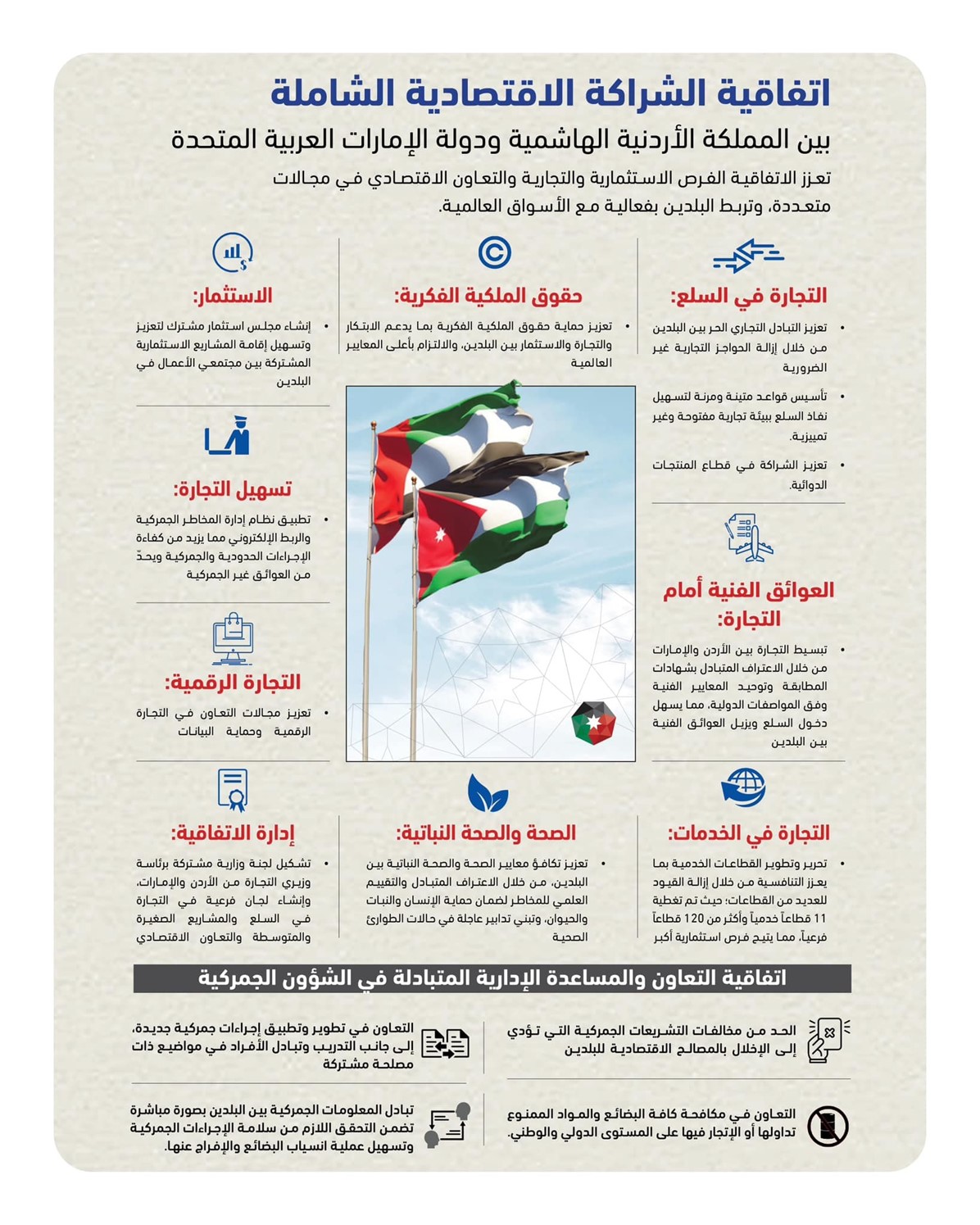Jordan and the United Arab Emirates will officially activate their Comprehensive Economic Partnership Agreement (CEPA) on Thursday, marking a milestone in bilateral cooperation aimed at deepening ties across a wide spectrum of economic sectors.
اضافة اعلان
The agreement, which was signed in October last year under the auspices of His Majesty King Abdullah II and UAE President His Highness Sheikh Mohamed bin Zayed Al Nahyan, is designed to open new avenues for strategic collaboration, unlock investment opportunities, and promote economic integration between the two nations.
Minister of Industry, Trade, and Supply, Yarub Qudah, said the agreement represents a major leap in economic cooperation and lays the groundwork for dynamic partnerships, particularly by encouraging the private sector to capitalize on synergies in areas such as industry and trade.
"The agreement provides a flexible and modern framework to reduce technical barriers, open markets, and facilitate the flow of goods in a fair and non-discriminatory commercial environment," Qudah noted in a statement to Petra. It also establishes a joint investment council and broadens cooperation in services, creating new channels for cross-border business and enterprise.
UAE Minister of State for Foreign Trade, Thani bin Ahmed Al Zeyoudi, highlighted the strategic significance of the agreement, stating that the two countries aim to boost non-oil bilateral trade to over $8 billion by 2032, up from $5.6 billion in 2023.
"This agreement signals a new chapter of constructive collaboration with Jordan," Al Zeyoudi said. "It strengthens our economic and trade relations, builds a platform for shared growth, and expands opportunities for long-term partnerships between our business communities."
He emphasized the UAE’s longstanding strategic partnership with Jordan, citing a 138% increase in non-oil trade over the past decade. The UAE is Jordan’s fifth-largest global trading partner and its leading foreign investor, with mutual investments valued at approximately $22.5 billion.
The agreement eliminates or reduces tariffs, dismantles trade barriers, and enhances supply chain connectivity paving the way for significant growth across sectors such as renewable energy, pharmaceuticals, logistics, and tourism.
Al Zeyoudi noted that Jordan’s skilled workforce and strong industrial base especially in phosphate, textiles, and pharmaceuticals complement the UAE’s capabilities in infrastructure, energy, and finance, creating a collaborative ecosystem with global reach.
The CEPA was concluded in just three rounds of negotiations, a testament to both countries’ shared commitment to fast-tracking mutual economic benefits.
Al Zeyoudi also underscored the agreement’s role in empowering SMEs by easing trade restrictions, encouraging innovation, and offering platforms that engage the next generation of entrepreneurs.
The agreement is part of the UAE’s broader CEPA strategy, a cornerstone of its economic diversification agenda. The UAE aims to double the size of its economy to $800 billion by 2030 and exceed $1.1 trillion in non-oil trade by 2031.
With 27 CEPA deals now concluded globally, the UAE has extended its commercial reach to over a quarter of the world’s population.
Notably, this is the UAE’s first CEPA with an Arab nation, and the first to come into force underscoring both countries’ commitment to fostering stronger trade and investment ties, advancing entrepreneurship, and supporting the growth of SMEs across the region.
Petra








